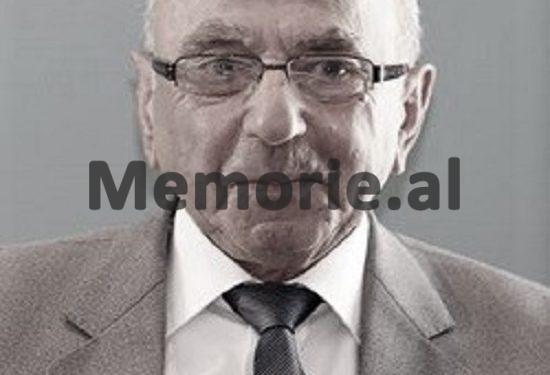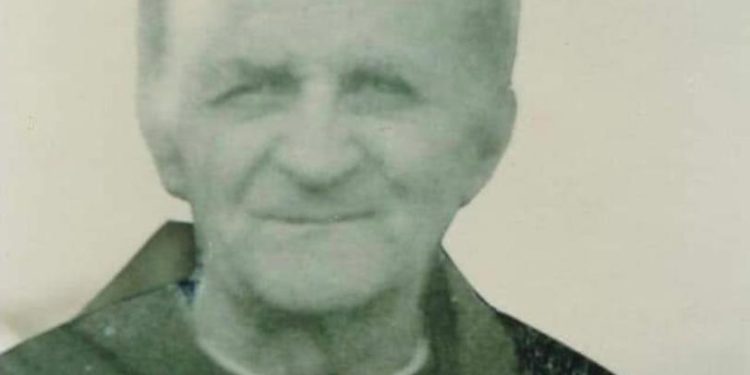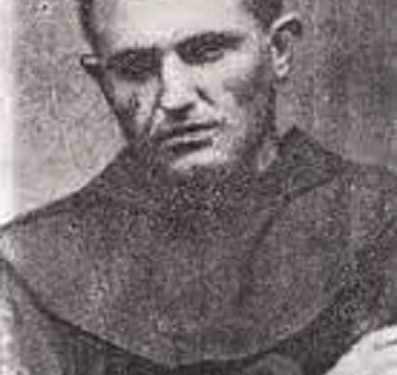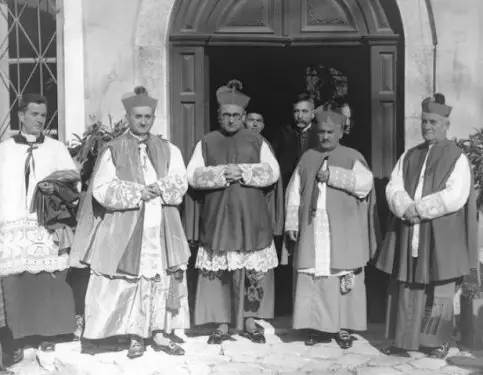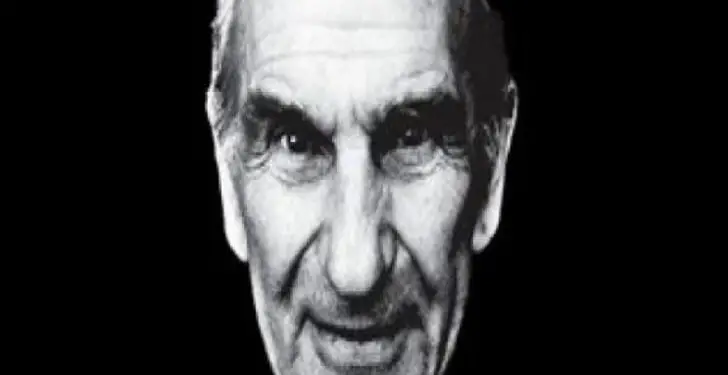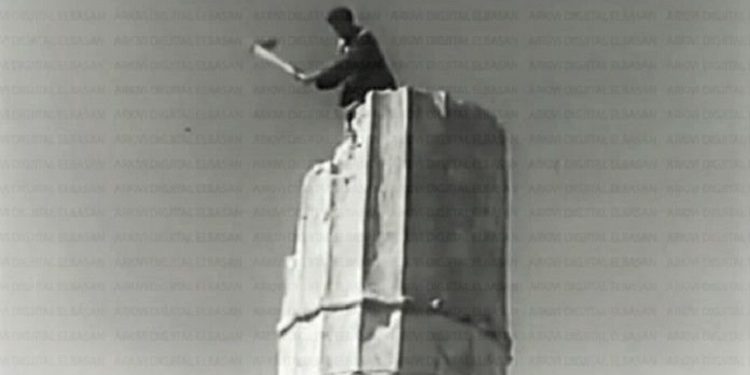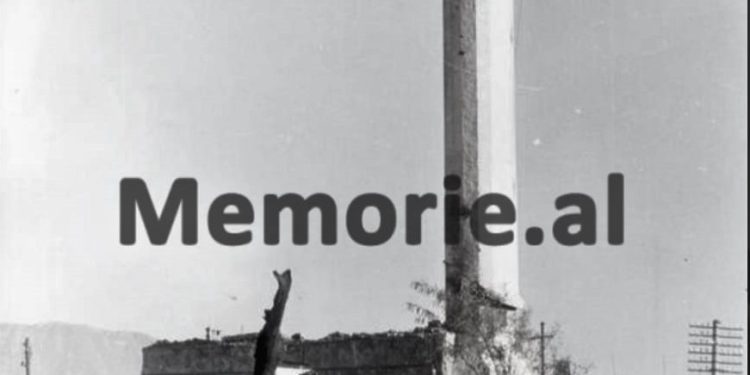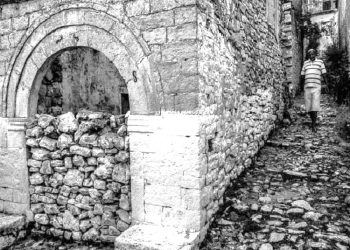From Gëzim Peshpia
-In prison with the Franciscan priests –
The first part
Memorie.al / From time to time I had published some writing about disconnected events with the permanent hesitation towards the well-known pens that brought this tragic time through their books. Even the passive description does not work, that’s why I had to become a commentator of this period, with the aim of presenting not only the tragic, but in general the life. With these glimpses of stories, I do not pretend to bring vivid images, but a very small contribution to the memorial in honor of their memory.
PRISON DIARY
We have been driving in the auto-jail for several hours. As far as we can smell, we are traveling south. I am related to Father Alex Baqlin, the Franciscan Father, who came to the re-education camp to complete his third decade of imprisonment. We had talked all the way about Father Viktor Volaj, my friend of whom I had the best memories.
I asked him with concern whether he had been arrested during the last “campaign” or not, but he told me that, until the last day of his freedom, he had heard nothing.
Father Victor led a completely isolated life. Catholic priests, especially the Franciscan ones, had always attracted me with their patriotism, with their commitment to the mission they had, with their deep knowledge and perhaps wearing a kind of mysterious veil in their organization.
The latter, as a result of all that powerful propaganda that was done against the clergy in general, but in particular against the Catholic one, who had the merit as a cultivator of patriotism and bearer of Albanian nationalism.
I had heard about the trial organized in Shkodër against Father Ndue Meshkalla, choosing as listeners the students of the pedagogical institute. This trial had turned into a boomerang against its organizers.
Although with Security agents and ignoramuses of that mold screaming “Crucify”, the trial failed and echoed throughout Albania. Father Meshkalla, with a physique the size of a fist, had sounded like a titan of thought and courage. With his outstanding erudition, which the persecutors had not calculated, he had put actors and directors together in an unpopular position.
Father Alex had been arrested at the workplace while pushing a wheelbarrow loaded with bricks. He worked in the Municipal enterprise, heavy work, although physically weak and disabled. Their arrest had been sensationalized, just as the name of an “agent” of the Vatican demanded.
We were in the middle of the auto-burg truck. My right hand was connected to his left. To light the match, I would hold the box and he would rub the pin in it, a ritual that was repeated often, because I kept the cigarette as something to beautify.
– “Don’t ask for forgiveness, because I myself was the craftsman of this vice”, – he told me laughing. He had a sweet, slow speech, a blush flushed his face, and his free hand often accompanied the words with movements. I was in a lot of pain. It seemed to me that I had seen it somewhere, but I tried in vain to bring it to mind.
I have always had a phenomenon of amnesia in remembering names and faces. Finally, it dawned on me. He looked to me like someone from Van der Weyden’s famous “Deposition” painting of Christ being taken down from the crucifixion.
Poor father! It was the epitome of suffering. It evoked such a feeling that everyone experiences when they are in front of a defenseless victim. But he didn’t feel alone at all!
He felt “Her” close at every moment. There was the source of his endurance and that of his friends. How strong these people felt! He was the author of the drama “Oso Kuka”, which was successfully performed during the Italian occupation. The allusion was quite palpable. The authorities stopped him.
Father Alexi, finally, confessed a concern to me. The commissar of the Tirana prison, when they had handed over their personal belongings, had given them the rosaries that they had found at the time of their arrest. They were amber rosaries on white mother-of-pearl. At the top they had a cross about eight centimeters with the statuette of the crucified Christ.
Each grain was coated on its half with a filigree work. They were really beautiful. He was instructed to deliver these rosaries to the prison commissioner. Such stagings aimed at humiliating religion and its preachers were popular especially in 1967, during the “Cultural Revolution”.
Below, between my legs, there was a hole from which I would throw out the cigarette ends and pour some plastic bag with the vomit of those who had been caught in the car. I told him to throw them in there, taking the blame on me, as if they had accidentally fallen from my hand straight into the hole. Father Alexi answered me: – “Save us, Lord! No, father, you don’t want to shoot me”!
I told him that apart from a week of isolation, they wouldn’t do anything else to me, because I wasn’t Catholic, so it wouldn’t be taken as an organized opposition. “Hold on, father,” he told me, “because you know those devils outside, but I know these insiders better.”
Meanwhile, after a long wait we arrived. The door finally opened and we breathed fresh air. After a journey of nearly seven hours, in an environment where you couldn’t tell what kind of stench was emanating, we got off as we were, tied two by two from the autoburg, in a yard, in front of a large door with iron bars. I had not seen nature for almost seven months. It was May.
Hungry eyes wandered from the greenery of the forest to the children, to the flowers, to the stones, to the lizards, and I realized that life had not stopped in place, as it had happened to us between concrete walls, isolated for so long.
I watched. Everyone was staring at things that ordinary people don’t notice. At a distance of ten meters, six soldiers with machine guns in their hands looked at us frowning, but not without curiosity. We stood until the attendant handed over the relevant documentation to the guard officer.
He verified us according to the accompanying cards. Father Aleksi was right, because our companion from Tirana said something while looking in his direction, while the guard officer, financier, a Vlach from Selenica, turned to us and asked the priest for the rosaries. He took them in his hand and resisted them for a long time.
Then he slowly dropped them into the box where the cards were and placed them on a bench near the meeting shack. Meanwhile, a group of prisoners returning from work approached the door. At the gate stood the non-commissioned officer, whose name was Ali.
He with a bar carved with a razor, beat his boots as soon as the gate opened, began to count the prisoners, moving the birch for each couple, did you say he conducted continuously in 2/4 time. The prison commissar approached from the command offices, a tall man with a frowning face. He stood in front of us sulking and looking at us openly with hatred.
– “Which of you is the Catholic priest?” – he asked in tone.
– “Me, Mr. Officer”, – replied father Alexi.
– “Hey! It’s been ten years since the people razed churches, mosques and mosques, while you continue to fall to the ground to spoil people’s minds with your vile propaganda.
But as soon as you seek ground for your consequent hostile activity, know that this is where you belong. You are determined, but we are more than you, and I believe you have understood this by now. What do you have these?
– …
– “Speak, what do you have these rosaries for”?
– “To pray”.
– “Pray as much as you want, neither God nor the devil can help you here. Ali, take a hammer and give it to this man.”
Prisoners who had returned from work were standing in a yard with us without yet entering the camp. The organized show had reserved for them the role of the audience. The discrediting purpose of the show seems to have been part of the tedious work, in the process of re-education.
Ali turned and brought a hammer from the forge nearby, which he handed to Father Alex. The commissar took the rosaries out of the drawer and placed them on a stone sofa.
– “Strike”!
– …
– “Strike, I tell you, do you hear?” Break it!”
-…
Nothing was leaking. I was looking at Alex’s father’s profile. His ears were red. Blood was on his face. That man, who looked scared at that moment, tensed up and looked the commissar straight in the face without moving his eyelids.
He seemed stern in his stance. The commissar, with a body twice that of the priest, suddenly seemed like a Lilliput before him, while Father Alexi took on a huge dimension. I was in the world of the priest…! How eternally real David and Goliath are!
The audience became tense. The commissioner was deciding how he would react…! The situation was unblocked by non-commissioned officer Aliu. He grabbed Father Alex’s hammer from his hand and fired at the statue of Christ. The beads scattered, flying in all directions, as the statuette of Christ was shattered into pieces.
Ali took the mole and fired the hammer again, shouting at the priest: – “Hey, where is your Christ? Why he doesn’t kill me and if he is really God, what do you say…”?!
The commissioner scowled along with a few servile faces, then turned his back and headed for the office. Brave Ali, scowling, threw the hammer at the forge. I was looking at Alex’s father’s profile.
I looked at his muttering lips…! He asked for mercy for those who… knew what they were doing. A few days later he told me: – “Our Father does not need screaming. He makes us feel the need we have for him even through the groaning of the soul…”!
Personal kitchen, Agimi, Beqiri and Nasi
When we were traveling by car, Father Aleksi told me about Father Zef Plumi, as a Franciscan priest with a strong character. He told me what he had taken away in prisons since he was young, until today. He was younger than father Alex Baqli.
As was the custom, Father Zefi invited me for coffee as well, since I was a new guest and had been associated with his friend and colleague, for whom, after arriving at the camp, apart from respect, I already felt adoration. We went to the personal kitchen, one of the nicest places in the camp. This was the first introduction to it.
The kitchen was a space 6 x 8 m., divided in the middle by a thick wall, one meter high, that on both sides had twenty furnaces where briquette powder mixed with ash and mud was used, made the size of a ball tennis, or something larger, as large as could be formed between the two hands.
In front of the roof was a space of a couple of cubits and occupied by barbed wire woven from the side of the fence. It was about twenty meters from the kitchen wall to the “clone”, where the guards’ posts were.
Just before we arrived, a prisoner had attempted to reach the clone wires, but the guard had fired a volley at his feet and forced him to lie still. It was not known whether it was an escape attempt or suicide.
“The culinary business has been monopolized by a few people”, Father Zefi explained with irony, as we approached the kitchen.
He approached a middle-aged man with a thin mustache on his lips that were blowing the fire with a small plywood which he held by a rubber tail and which facilitated his quick movements without tiring his wrist. Memorie.al
The next issue follows




